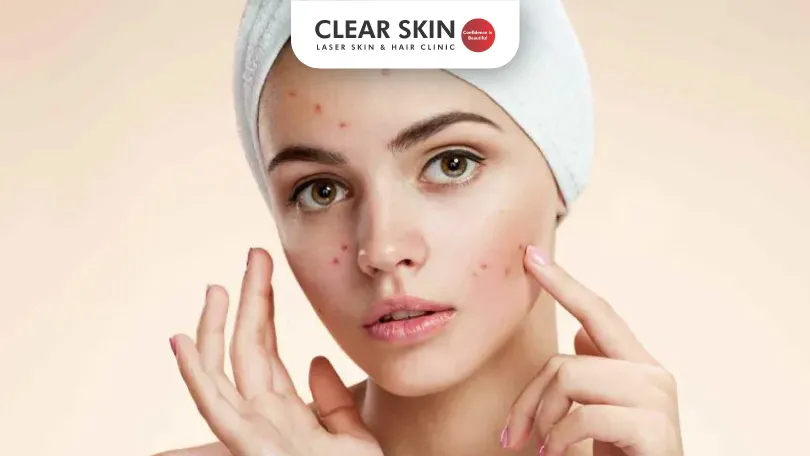Why My Acne Is Not Going Away?

Written by Clear Skin Content Team | Medically Reviewed by Dr. Dhanraj Chavan on April 28, 2025

Dealing with acne that just won’t go away? You’re not alone. Many people struggle with recurring pimples despite using multiple creams or face washes. This blog will help you understand why acne becomes stubborn and what steps you can take for clear, healthy skin — backed by expert dermatologists at ClearSkin Pune.
Table Of Content
- Understanding the Basics of Acne
- Possible Causes of Your Acne’s Resistance
- Effective Solutions for Stubborn Acne
- When to See Dermatologist For Acne?
- Conclusion
Understanding the Basics of Acne
You must have a basic overview of the nature of acne before we can explore the potential causes of your acne not clearing up. Excess sebum production and blocked pores are the root causes of acne. Acne, blackheads, and whiteheads may appear on the face, back, chest, and shoulders as a consequence.
The basics of Acne Development:
Stress, poor hygiene, hormone imbalances, and heredity are among the many variables that might bring on acne. Too much sebum, or oil, from the sebaceous glands, combines with surface germs and dead skin cells, clogging the pores. Acne lesions then develop when these clogged pores and hair follicles get irritated.
Types of Acne:
If you want to get to the bottom of your chronic acne, it helps to know what kinds of acne there are. Here are the most typical kinds:
- When oil, dead skin cells, and bacteria block pores, non-inflammatory types of acne called whiteheads and blackheads develop. Whiteheads are closed comedones, while blackheads are open. There is no redness here and thus they are non-inflammatory.
- Inflammatory acne manifests when the body starts fighting the sebum and bacteria in the clogged pores. The oil glands swell up and become red, causing papules and pustules. Papules are painful red bumps while pustules have pus in them.
- When these swollen oil glands reach to a critical point, the most severe acne, known as nodules or cysts, develops. Hard, painful nodules may be felt beneath the skin, whereas bigger, pus-filled cysts appear similar.
Possible Causes of Your Acne’s Resistance
Although most acne can be controlled and treated with the right skincare products and adjustments to your lifestyle, there are cases when it just won’t go away. If your acne is still there after all this time, these might be the reasons:
Hormonal effects and imbalances are major factors that could impede acne healing. Clogged pores and acne breakouts may occur when the sebaceous glands are continuously stimulated to create more sebum, as can happen with hormones like androgens. Acne, a already a chronic problem, then becomes much worse with conditions like polycystic ovarian syndrome (PCOS), thyroid disorders and other hormonal imbalances.
Another important factor is the improper use of skincare products. Many skin care products, when improperly used can become overly drying causing more sebum production and irritation. This can trigger rebound acne. Sometimes applying too many products at once, a condition called “product overload,” which may cause skin irritation and formation of new acne.
Unexplained medical issues are sometimes the root cause of persistent acne. Conditions that affect hormone levels and medicines taken for other illnesses may cause acne or prolong acne healing in patients.
Additionally, anxiety and stress also play a major role in acne’s ability to stay. When we’re under a lot of pressure, our bodies release more stress chemicals like cortisol, which may make our skin produce more oil and worsen acne. Improving skin condition is a common benefit of stress management strategies like exercise, mindfulness, or therapy.
Lastly, acne may be influenced by dietary choices. Sugary snacks, white bread and bakery products, and foods with a high glycemic index may lead to insulin and blood sugar spikes, which can exacerbate acne for certain people. Similarly, for some people, the hormones in milk and other dairy products might exacerbate acne. One strategy for managing chronic acne is to monitor your skin’s reaction to different meals and make necessary dietary adjustments.
The mental and emotional toll of living with chronic acne is very high in many and must be considered alongside any exterior causes. It is therefore essential to identify all factors, big and small that may affect acne and work for their resolution.
Effective Solutions for Stubborn Acne
Dermatologists often recommend a combination of treatments to clear up chronic acne, with each patient receiving individualised attention.
The first line of defence is often a topical therapy, such as a retinoid or benzoyl peroxide cream or gel. Vitamin A in the form of retinoids help keep pores clean and sebum at bay. At the same time, benzoyl peroxide kills germs and removes dead skin cells that cause acne.
When dealing with chronic acne, oral medicines are also quite important. To alleviate skin irritation and germs, antibiotics might be recommended. Hormonal treatment, which may include a combination of oral contraceptive pills or anti-androgenic drugs, may help people whose acne is caused by an imbalance in their hormones.
Chemical peels and laser therapy, two forms of professional acne treatment, are also important as a boost for people with chronic acne. A chemical peel is applied to the skin to exfoliate the skin’s surface, unclog pores, and eliminate dead skin cells. Conversely, laser treatment improves the look of scars and reduces oil production by targeting deeper layers of the skin.
When used with skincare regimens, these treatments may greatly enhance skin health and lessen the frequency of acne outbreaks.
When to See Dermatologist For Acne?
To properly manage persistent acne, it is necessary to consult with a dermatologist who is board-certified with proper qualifications. While over-the-counter remedies may work for moderate acne, a dermatologist may be necessary for severe or chronic instances.
If your acne continues to be unresponsive to over-the-counter medications, if it’s causing you severe pain or mental anguish, or if you see scarring, it’s time to see a dermatologist.
Factors including skin type, acne severity, and underlying causes—which an unskilled eye can miss—are considered by dermatologists when they provide a professional diagnosis.
Then, by integrating several treatments, they may create a unique treatment plan that meets the patients where they are most vulnerable. This customised strategy considers both the present and future state of the skin to treat acne effectively and avoid further outbreaks.
Do You Know?
Roughly 250 Patients Are Treated
Everyday By These Dermatologists
(You are one click away from flawless skin)
Meet Our Dermatologist!
Conclusion
Dealing with chronic acne may be a real pain, but it can be better managed if people have a good grasp of the condition’s basics and other affecting factors.
It’s important to remember that if acne doesn’t go away after trying several treatments, it may be time to see a dermatologist to figure out why. With a blend of focused treatments and personalised treatment regimens, dermatologist-approved solutions provide a glimmer of hope for those struggling with chronic acne.
Additionally, a regular skin care regimen and lifestyle changes may greatly enhance treatment results. To promote an atmosphere where clean, healthy skin is possible, this article seeks to provide readers with the necessary information and understanding to make educated choices about their acne treatment.
Further Reading
Post-Acne Marks vs Scars – What Pune Patients Should Know
Confused about post-acne marks and scars? Learn the key differences, why Pune’s climate affects healing, and which treatments work best at Clear Skin Clinic Pune.
Complete Guide to Acne: Types and Expert Treatment in Pune
Comprehensive acne treatment in Pune by Dr Dhanraj Chavan. Expert care for all acne types, affordable prices, & Free consultation. Book now!
Effective Tips to Remove Dark Spots on Hands
Expert guide to removing dark spots on hands in 2026. Latest natural remedies, medical treatments, and prevention tips from Dr Dhanraj Chavan.
Home Remedies for Melasma: What Helps, What Doesn’t, and When to See a Dermatologist?
Can home remedies treat melasma? Learn what works, what to avoid, and when to see a dermatologist for safe pigmentation care.
Have thoughts? Please let us know
We are committed not only to treating you, but also educating you.





